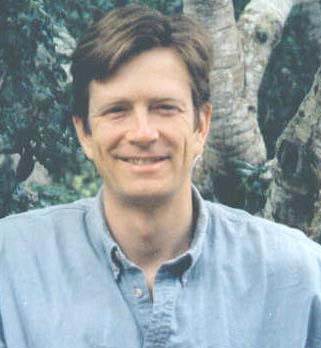Difference between revisions of "Faculty Listing"
m |
imported>Pmmckerc |
||
| (52 intermediate revisions by one other user not shown) | |||
| Line 1: | Line 1: | ||
| + | See [http://its.ucsc.edu/ecommons/ eCommons] for 2015 update | ||
| + | |||
{{Faculty|Candace Calsoyas|candacesq.jpg|Born in Rome Italy to parents in the Foreign Service, her interest in travel and international life was early established. Her childhood was nomadic, the early years being spent in New Haven, Princeton, and then in Livermore where physicists congregated at the Livermore Radiation laboratory. She attended University of California, Berkeley and managed to get a degree despite the tumult created by the Viet Nam war and four years of student demonstrations. After college, she moved to Santa Cruz where she became an organic farmer. She continued to study Biology and literature at the university merging her interests in farming and literature. Her Ph.D focused on women and land in which she researched women's empowerment based on their relationship to nature and farming. | {{Faculty|Candace Calsoyas|candacesq.jpg|Born in Rome Italy to parents in the Foreign Service, her interest in travel and international life was early established. Her childhood was nomadic, the early years being spent in New Haven, Princeton, and then in Livermore where physicists congregated at the Livermore Radiation laboratory. She attended University of California, Berkeley and managed to get a degree despite the tumult created by the Viet Nam war and four years of student demonstrations. After college, she moved to Santa Cruz where she became an organic farmer. She continued to study Biology and literature at the university merging her interests in farming and literature. Her Ph.D focused on women and land in which she researched women's empowerment based on their relationship to nature and farming. | ||
| − | In 2004, she signed on to teach Literature of the Sea on the California Maritime Ship, The Golden Bear. For two summers, she traveled and taught on the ship going to Asia and then to the South Pacific. In 2006, she taught for Semester at Sea, going on a four month voyage around the world. When she returned, she continued teaching Literature of the Sea at College 8 in addition to overseeing the garden internship program. What has been most rewarding at UCSC has been "the opportunity to combine my love of literature, my passion for farming, and travel in my teaching career." mailto:calsoyas@ucsc.edu |}} | + | In 2004, she signed on to teach Literature of the Sea on the California Maritime Ship, The Golden Bear. For two summers, she traveled and taught on the ship going to Asia and then to the South Pacific. In 2006, she taught for Semester at Sea, going on a four month voyage around the world. When she returned, she continued teaching Literature of the Sea at College 8 in addition to overseeing the garden internship program. What has been most rewarding at UCSC has been "the opportunity to combine my love of literature, my passion for farming, and travel in my teaching career." mailto:calsoyas@ucsc.edu. 228 College Eight Monday 10-11. Wednesday 2-3 |}} |
| + | |||
| + | |||
| + | {{Faculty|Patrick Chuang|patrickc.jpg|[http://people.ucsc.edu/~pchuang/ Patrick Chuang] studies pollution in the atmosphere, which may help refine global warming models.[mailto:pchuang@es.ucsc.edu]|http://people.ucsc.edu/~pchuang/|}} | ||
| + | |||
| + | |||
| + | {{Faculty|Laurel Fox|LFox.jpg|My research emphasizes the effects of interactions on community structure and dynamics, especially plant-herbivore and three- trophic-level interactions. I am particularly interested in resource use, plant defenses and the role of nutrients. I have worked in numerous systems, including Eucalyptus trees in Australia and maritime chaparral in California. Other work in my lab include includes the dynamics of endangered plants, ecological effects of climate change and community effects of invasive species|http://fox.eeb.ucsc.edu/|}} | ||
| + | |||
| + | {{Faculty|Joy Hagen|joyhsm2.jpg|Joy is currently doing research on genetically modified organisms. [mailto:joyhagen@ucsc.edu] 333 College Eight|}} | ||
| − | |||
| + | {{Faculty|Ronnie Lipschutz|rlipsch.jpg| Ronnie Lipschutz, College 8 Provost, teaches courses on international politics, foreign policy, politics and popular culture, global environmental politics, green philosophy and ethics, capitalism, empire, sustainability engineering and other topics. He has been Director and Co-Director of the UCSC [http://cgirs.ucsc.edu/ Center for Global, International and Regional Studies (CGIRS)], and is a co-founder of the faculty group in [http://seed.soe.ucsc.edu/ Sustainability Engineering and Ecological Design (SEED)]. He has published widely; his most recent book is Political Economy, Capitalism and Popular Culture (Rowman & Littlefield, 2010). [mailto:rlipsch@ucsc.edu]| http://politics.ucsc.edu/faculty/singleton.php?&singleton=true&cruz_id=rlipsch}} | ||
| − | |||
| − | {{Faculty|Patrick McKercher|mckercher1.jpg|Patrick McKercher teaches in the Writing Program at the University of California Santa Cruz. He did his doctoral work on the nature and use of metaphor in the Rhetoric and Linguistics program at the University of British Columbia in Vancouver, Canada. He has extensive outreach experience and worked on integrating digital technology into K-16 education. In particular, he has researched the educational potential of virtual worlds from time of text-based MUDs/MOOs to the present. More recently, he has been project manager for James Burke's Knowledge Web [http://k-web.org K-Web.org], an open source collaborative and immersive knowledge navigation tool. In addition, he has worked on documentaries shown on public broadcasting such as [http://www.kcsm.org/tv/catalog/Reconnections/index.htm ReConnections] and So My Grandchildren Will Know. [mailto:pmmckerc@ucsc.edu]|http://people.ucsc.edu/~pmmckerc/}} | + | {{Faculty|Patrick McKercher|mckercher1.jpg|Patrick McKercher teaches in the Writing Program at the University of California Santa Cruz. He did his doctoral work on the nature and use of metaphor in the Rhetoric and Linguistics program at the University of British Columbia in Vancouver, Canada. He has extensive outreach experience and worked on integrating digital technology into K-16 education. In particular, he has researched the educational potential of virtual worlds from time of text-based MUDs/MOOs to the present. More recently, he has been project manager for James Burke's Knowledge Web [http://k-web.org K-Web.org], an open source collaborative and immersive knowledge navigation tool. In addition, he has worked on documentaries shown on public broadcasting such as [http://www.kcsm.org/tv/catalog/Reconnections/index.htm ReConnections] and So My Grandchildren Will Know. He is currently doing research on [https://docs.google.com/document/d/1KPtJMUbEUSFq5HtTvcid7rYTmKVohOR27hcj6jZBoKE/edit denialism] of climate change. He created this wiki and seeks content for it. [mailto:pmmckerc@ucsc.edu]. 125 College Eight |http://people.ucsc.edu/~pmmckerc/}} |
| + | |||
{{Faculty|Dustin Mulvaney|Dustin.jpg|Dustin received a Ph.D. in Environmental Studies at the University of California, Santa Cruz, and holds a B.S. in Chemical Engineering and a M.S. in Environmental Policy Studies from the New Jersey Institute of Technology. His dissertation research explored social resistance to genetically engineered organisms and the efficacy of the anti-genetic engineering social movement. Before coming to UCSC, Dustin worked as a site engineer for a bioremediation firm. Previous to that, he spent several years in the chemical industry as a process engineer. He is currently working on turning his dissertation into a book manuscript, while pursuing new research projects on the California rice industry, criteria for salmon aquaculture certification, gene flow in maize landraces, and the effects of climate change on sugar maples. mailto:dustin.mulvaney@gmail.com|}} | {{Faculty|Dustin Mulvaney|Dustin.jpg|Dustin received a Ph.D. in Environmental Studies at the University of California, Santa Cruz, and holds a B.S. in Chemical Engineering and a M.S. in Environmental Policy Studies from the New Jersey Institute of Technology. His dissertation research explored social resistance to genetically engineered organisms and the efficacy of the anti-genetic engineering social movement. Before coming to UCSC, Dustin worked as a site engineer for a bioremediation firm. Previous to that, he spent several years in the chemical industry as a process engineer. He is currently working on turning his dissertation into a book manuscript, while pursuing new research projects on the California rice industry, criteria for salmon aquaculture certification, gene flow in maize landraces, and the effects of climate change on sugar maples. mailto:dustin.mulvaney@gmail.com|}} | ||
| − | {{Faculty|John Newman|jangoclr.jpg|John has worked as a journalist for various outdoor magazines, and is also an accomplished musician and photographer. mailto: | + | {{Faculty|John Newman|jangoclr.jpg|John has worked as a journalist for various outdoor magazines, and is also an accomplished musician and photographer. mailto:jtnwm@att.net. Office Rm 113|}} |
| − | {{Faculty|Ingrid Parker|iparker.jpg| Ingrid Parker studies invasive plant species. | + | {{Faculty|Ingrid Parker|iparker.jpg| Ingrid Parker studies invasive plant species. She seek to understand what controls plant distribution and abundance, with an emphasis on species interactions. Much of her current work focuses on the evolutionary ecology of plant-insect and plant-disease interactions. |
| − | {{Faculty|Ravi Rajan, Provost|ravi1.jpg| | + | For many of her research questions she uses biological invasions as a tool to study ecological processes. Non-native species, which can be seen as invaders to natural communities, give us an opportunity to study ecological and evolutionary shifts in response to new conditions and new species interactions. One of her current projects is on the role of pathogens in controlling populations of native vs. non-native clovers on the California Coast. Are introduced species released from the pressure of natural enemies? |
| + | |||
| + | Biological invasions are also one of the most urgent conservation issues of our time. She has an interest in both documenting the ecological impacts of particular invasions, and understanding the biology behind those impacts. Can we accurately assess the risk of introducing new species (or transgenic/GMO varieties)? [mailto:parker@biology.ucsc.edu]|http://bio.research.ucsc.edu/people/parker/}} | ||
| + | |||
| + | |||
| + | {{Faculty|Ken Pedrotti|Ken2.jpg|Kenneth Pedrotti is currently the chair of the Department of Electrical Engineering at the Baskin School of Engineering at University of California at Santa Cruz. He received his BS in Engineering Physics from University of California Berkeley in 1978. He received his MS in electrical engineering specializing in quantum electronics, in 1979 and Ph.D. in electrical engineering, from Stanford University working at the Ginzton Laboratory on problems in non-linear optics and atomic physics. | ||
| + | |||
| + | Dr. Pedrotti joined the faculty of the Electrical Engineering Department at the University of California, Santa Cruz in Sept. 2000. His current projects include, sensor interfaces for data array sensing and processing, low power VLSI clock distribution, low phase noise oscillators and next generation optical data storage systems.|http://www.ee.ucsc.edu/people/kdp}} | ||
| + | |||
| + | |||
| + | {{Faculty|Ravi Rajan, Provost emeritus|ravi1.jpg| | ||
Ravi Rajan is a humanist and social scientist, whose research focuses on environmental issues in governance, corporate responsibility, globalization, entrepreneurship, technology choice, and risk and disaster management. | Ravi Rajan is a humanist and social scientist, whose research focuses on environmental issues in governance, corporate responsibility, globalization, entrepreneurship, technology choice, and risk and disaster management. | ||
| Line 23: | Line 43: | ||
Educated at Delhi (BA Mathematics, MA, Philosophy); Oxford (D.Phil., Environmental History); Berkeley (post doc in Geography); Cornell (post doc in Science and Technology Studies and Global Environmental Studies) and the Max Planck Institute, Berlin, (post doc in Environmental History and Science and Technology Studies), he is currently a tenured Associate Professor of Environmental Studies at University of California, Santa Cruz, and Provost of College Eight. | Educated at Delhi (BA Mathematics, MA, Philosophy); Oxford (D.Phil., Environmental History); Berkeley (post doc in Geography); Cornell (post doc in Science and Technology Studies and Global Environmental Studies) and the Max Planck Institute, Berlin, (post doc in Environmental History and Science and Technology Studies), he is currently a tenured Associate Professor of Environmental Studies at University of California, Santa Cruz, and Provost of College Eight. | ||
| − | Rajan has served on the editorial board of Environment and History, as Program Chair for the 2003 Annual meeting of the American Society for Environmental History; as a manuscript referee for several leading academic journals and presses, and as a referee for renowned research agencies such as the National Science Foundation. Rajan has also served as the President of the Board of Directors of Pesticide Action Network, North America(PANNA). mailto:srrajan@ucsc.edu|http://people.ucsc.edu/~srrajan/}} | + | Rajan has served on the editorial board of Environment and History, as Program Chair for the 2003 Annual meeting of the American Society for Environmental History; as a manuscript referee for several leading academic journals and presses, and as a referee for renowned research agencies such as the National Science Foundation. Rajan has also served as the President of the Board of Directors of Pesticide Action Network, North America(PANNA). Environmental rights lecture [http://envs.ucsc.edu/news-events/news/rajan-video-sept2011.html (video).] mailto:srrajan@ucsc.edu|http://people.ucsc.edu/~srrajan/}} |
{{Faculty|Neil Schaefer|neilssm1.jpg|Hi everyone, My name is Neil Schaefer. The themes and questions raised in our section of College Eight Core will be based largely on what you, the students, find interesting and important in the texts. Class preparation and participation are important. You will develop your own | {{Faculty|Neil Schaefer|neilssm1.jpg|Hi everyone, My name is Neil Schaefer. The themes and questions raised in our section of College Eight Core will be based largely on what you, the students, find interesting and important in the texts. Class preparation and participation are important. You will develop your own | ||
| Line 29: | Line 49: | ||
will present the pros and cons of some recent home town proposal that | will present the pros and cons of some recent home town proposal that | ||
would have important environmental consequences (good or bad). | would have important environmental consequences (good or bad). | ||
| − | |||
Here's my background: I have a Ph.D in Philosophy from the University | Here's my background: I have a Ph.D in Philosophy from the University | ||
| Line 35: | Line 54: | ||
ethics, and philosophy of science. As an undergraduate, I studied | ethics, and philosophy of science. As an undergraduate, I studied | ||
Finance at Santa Clara University and Psychology at Stevenson College. | Finance at Santa Clara University and Psychology at Stevenson College. | ||
| − | But one of my secret passions is writing haiku. neil_schaefer (at) yahoo.com|}} | + | But one of my secret passions is writing haiku. neil_schaefer (at) yahoo.com. 228 College Eight Tuesdays 3:45-4:30 and by appt.|}} |
{{Faculty|Dan Scripture|Dan.jpg|Dan is the College Eight Writing Coordinator, has completed a novel about the Viet Nam war and has recently become a proud grandfather. mailto:scriptu@ucsc.edu|}} | {{Faculty|Dan Scripture|Dan.jpg|Dan is the College Eight Writing Coordinator, has completed a novel about the Viet Nam war and has recently become a proud grandfather. mailto:scriptu@ucsc.edu|}} | ||
| Line 43: | Line 62: | ||
Robin Somers was born in Palo Alto, California. She received her BA in literature from UCSC and an MFA in Creative Writing from San Jose State University. She recently finished her first novel, Tornado Kansas, which won the Marjorie McLaughlin Folendorf and William Turnbull awards. She is a recipient of the Alice Longan award for women writing about the Southwest, and her essay on Native American boarding schools won the Charles Redd award (BYU) from the Southwest Popular Culture Association. Her work is published in the Anthology of Monterey Bay Poets, Reed Literary Magazine, Dry Ground, and others. She was a guest poet at the Berkeley Environmental Watershed Poetry Festival and often appears on Palo Alto Cable TV’s Live Poets Society. | Robin Somers was born in Palo Alto, California. She received her BA in literature from UCSC and an MFA in Creative Writing from San Jose State University. She recently finished her first novel, Tornado Kansas, which won the Marjorie McLaughlin Folendorf and William Turnbull awards. She is a recipient of the Alice Longan award for women writing about the Southwest, and her essay on Native American boarding schools won the Charles Redd award (BYU) from the Southwest Popular Culture Association. Her work is published in the Anthology of Monterey Bay Poets, Reed Literary Magazine, Dry Ground, and others. She was a guest poet at the Berkeley Environmental Watershed Poetry Festival and often appears on Palo Alto Cable TV’s Live Poets Society. | ||
| − | Ms. Somers served as an associate editor for The Sun (Santa Cruz) in the late-80s and a staff reporter for The Union Democrat in the late-90s before returning to teaching in the Sierra Nevada foothills, then San Jose State University. She now teaches writing for College 8 and the Writing Program at UCSC. She remains a senior faculty member of the Rocky Mountain Modern Language Association, where she recently presented a paper on Native American author and activist Zitkala-Sa and chaired a special session on The Meaning of Food. mailto:robinsomers@sbcglobal.net | + | Ms. Somers served as an associate editor for The Sun (Santa Cruz) in the late-80s and a staff reporter for The Union Democrat in the late-90s before returning to teaching in the Sierra Nevada foothills, then San Jose State University. She now teaches writing for College 8 and the Writing Program at UCSC. She remains a senior faculty member of the Rocky Mountain Modern Language Association, where she recently presented a paper on Native American author and activist Zitkala-Sa and chaired a special session on The Meaning of Food. mailto:robinsomers@sbcglobal.net. 113 College Eight TTH 2:30-3:30 and by appt |
|}} | |}} | ||
| Line 50: | Line 69: | ||
Today, Glenn Stewart uses the iconic peregrine falcon—a species the Predatory Bird Research Group dedicated captive breeding and management expertise to that helped its recovery from near extinction—to connect people with nature. A program including “citizen science,” public presentations, falcon nest web cameras, on-line falcon discussion forums, and student internships is in place to help achieve conservation goals. mailto:gstewart@ucsc.edu |http://www.scpbrg.org}} | Today, Glenn Stewart uses the iconic peregrine falcon—a species the Predatory Bird Research Group dedicated captive breeding and management expertise to that helped its recovery from near extinction—to connect people with nature. A program including “citizen science,” public presentations, falcon nest web cameras, on-line falcon discussion forums, and student internships is in place to help achieve conservation goals. mailto:gstewart@ucsc.edu |http://www.scpbrg.org}} | ||
| − | {{Faculty|Sean Swezey|seanssm1.jpg|Sean L. Swezey received his Ph. D. in Entomology from the University of California, Berkeley in 1982. He is currently Associate Director and Specialist for organic farming systems research and extension at the Center for Agroecology and Sustainable Food Systems at UC Santa Cruz. His research interests emphasize the practical application of pest management theory and on-farm research to production of organic strawberries, apples, and other California organic crops. His career includes teaching and research appointments at UC Berkeley (1976-81), the National Autonomous University of Nicaragua, Leon (1981-1988), Cornell University (1983-84), and UC Santa Cruz (1987-present) where he has taught as Lecturer and Adjunct Associate Professor in the Department of Environmental Studies. In the department, he teaches upper division courses on organic agriculture, integrated pest management, and principles of sustainable agriculture. mailto:findit@ucsc.edu|http://www2.ucsc.edu/cgirs/research/environment/afsrg/members.html}} | + | {{Faculty|Sean Swezey|seanssm1.jpg|[http://www2.ucsc.edu/cgirs/research/environment/afsrg/members.html#Anchor-Sean-17304 Sean L. Swezey] received his Ph. D. in Entomology from the University of California, Berkeley in 1982. He is currently Associate Director and Specialist for organic farming systems research and extension at the Center for Agroecology and Sustainable Food Systems at UC Santa Cruz. His research interests emphasize the practical application of pest management theory and on-farm research to production of organic strawberries, apples, and other California organic crops. His career includes teaching and research appointments at UC Berkeley (1976-81), the National Autonomous University of Nicaragua, Leon (1981-1988), Cornell University (1983-84), and UC Santa Cruz (1987-present) where he has taught as Lecturer and Adjunct Associate Professor in the Department of Environmental Studies. In the department, he teaches upper division courses on organic agriculture, integrated pest management, and principles of sustainable agriculture. mailto:findit@ucsc.edu. Office: Tu Th 10-11 Building A-1, PICA, |
| + | Lower Quarry|http://www2.ucsc.edu/cgirs/research/environment/afsrg/members.html}} | ||
| + | |||
| + | {{Faculty|Terry Terhaar|TerryH.jpg|Terry Terhaar received a M.F.S. and a Ph.D. in the environmental sciences and humanities from Yale University. Her research resides at the intersection between the social sciences and the humanities, with an emphasis on the human-environment relationship. She has a particular focus on biodiversity conservation; environmental values and ethics; ecology and spirituality; environmental policy; and nature literature. In addition to teaching Environment and Society, she teaches classes for the Writing Program including: Global Warming, Biodiversity, and the Environment; and The Environment, Human Rights, and Social Justice. She loves writing, teaching, being outdoors, and talking with students about any of these activities. She especially likes talking with new students.[mailto:tterhaar@ucsc.edu]. 229 College Eight Friday 10:45am-12:15pm and by appt}} | ||
| + | |||
| + | |||
| + | {{Faculty|John Vesecky|Vesecky.jpg| | ||
| + | [http://www.ee.ucsc.edu/people/vesecky John Vesecky] is working on [http://news.ucsc.edu/2010/06/3892.html Greening the Wharf] in Santa Cruz. He also does HF radar design and construction and observation of ocean surface winds, waves and currents with applications to coastal and deep water ocean processes; project MEDSAT. He grew up in Dallas, Texas and studied Electrical Engineering at Rice University before attending graduate school at Stanford. His career in science, engineering and university education spans X-ray astronomy to remote sensing with HF radar and microwaves to renewable energy systems. He taught astronomy at the University of Leicester (UK) and went on to do teaching and research at Stanford, Michigan and now at the University of California, Santa Cruz. In the 1990’s Prof. Vesecky was selected as Sensor Team Leader for Vice-President Gore’s Environmental Task Force that identified classified data of environmental value and argued successfully for declassification. In 1999 he was selected as Founding Chairman of the Electrical Engineering Department in the new Jack Baskin Engineering School. He is an IEEE Fellow.|http://www.ee.ucsc.edu/people/vesecky}} | ||
| + | |||
| + | |||
| + | {{Faculty|Susan Watrous||Susan is the Coordinator for the College Eight Core course, a working journalist and editor, and also is the Print Advisor for Student Media mailto:swatrous@ucsc.edu. 113 College Eight Mondays, 6:30-8 pm and Thursdays, 8:30-9:30 am or by appt.|}} | ||
| − | {{Faculty| | + | {{Faculty|Clara Weygandt||Office: 209 College Eight Mon, Weds and Fridays from 2 to 3 & by appt.|}} |
| − | |||
[[Category:Food]] | [[Category:Food]] | ||
[[Category:Wildlife]] | [[Category:Wildlife]] | ||
Latest revision as of 12:41, 18 October 2018
See eCommons for 2015 update
| Candace Calsoyas | |
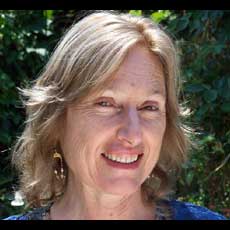
|
Born in Rome Italy to parents in the Foreign Service, her interest in travel and international life was early established. Her childhood was nomadic, the early years being spent in New Haven, Princeton, and then in Livermore where physicists congregated at the Livermore Radiation laboratory. She attended University of California, Berkeley and managed to get a degree despite the tumult created by the Viet Nam war and four years of student demonstrations. After college, she moved to Santa Cruz where she became an organic farmer. She continued to study Biology and literature at the university merging her interests in farming and literature. Her Ph.D focused on women and land in which she researched women's empowerment based on their relationship to nature and farming.
In 2004, she signed on to teach Literature of the Sea on the California Maritime Ship, The Golden Bear. For two summers, she traveled and taught on the ship going to Asia and then to the South Pacific. In 2006, she taught for Semester at Sea, going on a four month voyage around the world. When she returned, she continued teaching Literature of the Sea at College 8 in addition to overseeing the garden internship program. What has been most rewarding at UCSC has been "the opportunity to combine my love of literature, my passion for farming, and travel in my teaching career." mailto:calsoyas@ucsc.edu. 228 College Eight Monday 10-11. Wednesday 2-3 |
| [ website] | |
| Patrick Chuang | |
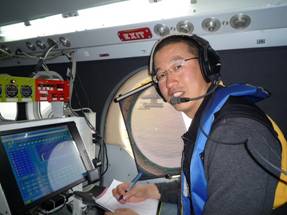
|
Patrick Chuang studies pollution in the atmosphere, which may help refine global warming models.[1] |
| website | |
| Laurel Fox | |
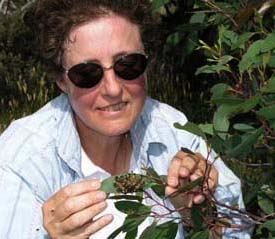
|
My research emphasizes the effects of interactions on community structure and dynamics, especially plant-herbivore and three- trophic-level interactions. I am particularly interested in resource use, plant defenses and the role of nutrients. I have worked in numerous systems, including Eucalyptus trees in Australia and maritime chaparral in California. Other work in my lab include includes the dynamics of endangered plants, ecological effects of climate change and community effects of invasive species |
| website | |
| Joy Hagen | |
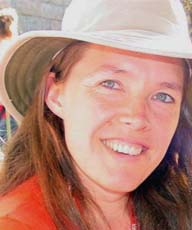
|
Joy is currently doing research on genetically modified organisms. [2] 333 College Eight |
| [ website] | |
| Ronnie Lipschutz | |
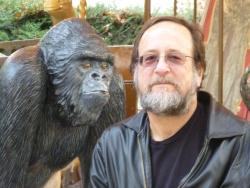
|
Ronnie Lipschutz, College 8 Provost, teaches courses on international politics, foreign policy, politics and popular culture, global environmental politics, green philosophy and ethics, capitalism, empire, sustainability engineering and other topics. He has been Director and Co-Director of the UCSC Center for Global, International and Regional Studies (CGIRS), and is a co-founder of the faculty group in Sustainability Engineering and Ecological Design (SEED). He has published widely; his most recent book is Political Economy, Capitalism and Popular Culture (Rowman & Littlefield, 2010). [3] |
| [{{{4}}} website] | |
| Patrick McKercher | |
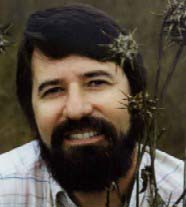
|
Patrick McKercher teaches in the Writing Program at the University of California Santa Cruz. He did his doctoral work on the nature and use of metaphor in the Rhetoric and Linguistics program at the University of British Columbia in Vancouver, Canada. He has extensive outreach experience and worked on integrating digital technology into K-16 education. In particular, he has researched the educational potential of virtual worlds from time of text-based MUDs/MOOs to the present. More recently, he has been project manager for James Burke's Knowledge Web K-Web.org, an open source collaborative and immersive knowledge navigation tool. In addition, he has worked on documentaries shown on public broadcasting such as ReConnections and So My Grandchildren Will Know. He is currently doing research on denialism of climate change. He created this wiki and seeks content for it. [4]. 125 College Eight |
| website | |
| Dustin Mulvaney | |
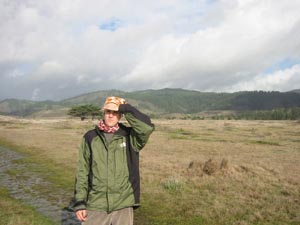
|
Dustin received a Ph.D. in Environmental Studies at the University of California, Santa Cruz, and holds a B.S. in Chemical Engineering and a M.S. in Environmental Policy Studies from the New Jersey Institute of Technology. His dissertation research explored social resistance to genetically engineered organisms and the efficacy of the anti-genetic engineering social movement. Before coming to UCSC, Dustin worked as a site engineer for a bioremediation firm. Previous to that, he spent several years in the chemical industry as a process engineer. He is currently working on turning his dissertation into a book manuscript, while pursuing new research projects on the California rice industry, criteria for salmon aquaculture certification, gene flow in maize landraces, and the effects of climate change on sugar maples. mailto:dustin.mulvaney@gmail.com |
| [ website] | |
| John Newman | |

|
John has worked as a journalist for various outdoor magazines, and is also an accomplished musician and photographer. mailto:jtnwm@att.net. Office Rm 113 |
| [ website] | |
| Ingrid Parker | |
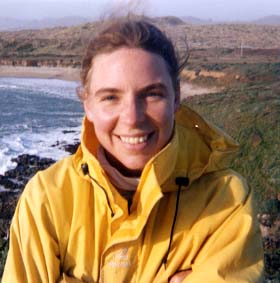
|
Ingrid Parker studies invasive plant species. She seek to understand what controls plant distribution and abundance, with an emphasis on species interactions. Much of her current work focuses on the evolutionary ecology of plant-insect and plant-disease interactions.
For many of her research questions she uses biological invasions as a tool to study ecological processes. Non-native species, which can be seen as invaders to natural communities, give us an opportunity to study ecological and evolutionary shifts in response to new conditions and new species interactions. One of her current projects is on the role of pathogens in controlling populations of native vs. non-native clovers on the California Coast. Are introduced species released from the pressure of natural enemies? Biological invasions are also one of the most urgent conservation issues of our time. She has an interest in both documenting the ecological impacts of particular invasions, and understanding the biology behind those impacts. Can we accurately assess the risk of introducing new species (or transgenic/GMO varieties)? [5] |
| website | |
| Ken Pedrotti | |
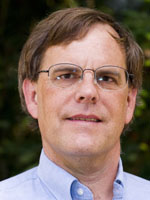
|
Kenneth Pedrotti is currently the chair of the Department of Electrical Engineering at the Baskin School of Engineering at University of California at Santa Cruz. He received his BS in Engineering Physics from University of California Berkeley in 1978. He received his MS in electrical engineering specializing in quantum electronics, in 1979 and Ph.D. in electrical engineering, from Stanford University working at the Ginzton Laboratory on problems in non-linear optics and atomic physics.
Dr. Pedrotti joined the faculty of the Electrical Engineering Department at the University of California, Santa Cruz in Sept. 2000. His current projects include, sensor interfaces for data array sensing and processing, low power VLSI clock distribution, low phase noise oscillators and next generation optical data storage systems. |
| website | |
| Ravi Rajan, Provost emeritus | |
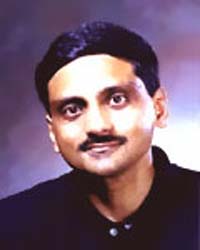
|
Ravi Rajan is a humanist and social scientist, whose research focuses on environmental issues in governance, corporate responsibility, globalization, entrepreneurship, technology choice, and risk and disaster management. Educated at Delhi (BA Mathematics, MA, Philosophy); Oxford (D.Phil., Environmental History); Berkeley (post doc in Geography); Cornell (post doc in Science and Technology Studies and Global Environmental Studies) and the Max Planck Institute, Berlin, (post doc in Environmental History and Science and Technology Studies), he is currently a tenured Associate Professor of Environmental Studies at University of California, Santa Cruz, and Provost of College Eight. Rajan has served on the editorial board of Environment and History, as Program Chair for the 2003 Annual meeting of the American Society for Environmental History; as a manuscript referee for several leading academic journals and presses, and as a referee for renowned research agencies such as the National Science Foundation. Rajan has also served as the President of the Board of Directors of Pesticide Action Network, North America(PANNA). Environmental rights lecture (video). mailto:srrajan@ucsc.edu |
| website | |
| Dan Scripture | |

|
Dan is the College Eight Writing Coordinator, has completed a novel about the Viet Nam war and has recently become a proud grandfather. mailto:scriptu@ucsc.edu |
| [ website] | |
| Robin Somers | |
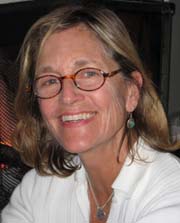
|
Robin Somers was born in Palo Alto, California. She received her BA in literature from UCSC and an MFA in Creative Writing from San Jose State University. She recently finished her first novel, Tornado Kansas, which won the Marjorie McLaughlin Folendorf and William Turnbull awards. She is a recipient of the Alice Longan award for women writing about the Southwest, and her essay on Native American boarding schools won the Charles Redd award (BYU) from the Southwest Popular Culture Association. Her work is published in the Anthology of Monterey Bay Poets, Reed Literary Magazine, Dry Ground, and others. She was a guest poet at the Berkeley Environmental Watershed Poetry Festival and often appears on Palo Alto Cable TV’s Live Poets Society. Ms. Somers served as an associate editor for The Sun (Santa Cruz) in the late-80s and a staff reporter for The Union Democrat in the late-90s before returning to teaching in the Sierra Nevada foothills, then San Jose State University. She now teaches writing for College 8 and the Writing Program at UCSC. She remains a senior faculty member of the Rocky Mountain Modern Language Association, where she recently presented a paper on Native American author and activist Zitkala-Sa and chaired a special session on The Meaning of Food. mailto:robinsomers@sbcglobal.net. 113 College Eight TTH 2:30-3:30 and by appt |
| [ website] | |
| Glen Stewart | |
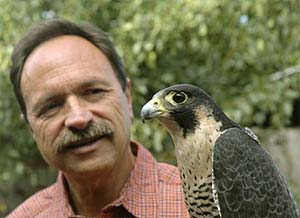
|
Glenn R. Stewart is coordinator for the Santa Cruz Predatory Bird Research Group with offices at Long Marine Lab. He is a conservation biologist who led projects to restore extinct populations of bald eagles to Central California from a research station in Big Sur, and Harris’ hawks to the lower Colorado River along the California/Arizona border. He also studied goshawks in the eastern Sierra Nevada and bald eagles at Prince William Sound, Alaska. He worked to protect public recreation and wildlife values on public lands as executive director of Idaho Conservation League during the early 1990’s.
Today, Glenn Stewart uses the iconic peregrine falcon—a species the Predatory Bird Research Group dedicated captive breeding and management expertise to that helped its recovery from near extinction—to connect people with nature. A program including “citizen science,” public presentations, falcon nest web cameras, on-line falcon discussion forums, and student internships is in place to help achieve conservation goals. mailto:gstewart@ucsc.edu |
| website | |
| Sean Swezey | |
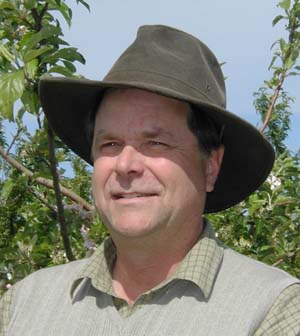
|
Sean L. Swezey received his Ph. D. in Entomology from the University of California, Berkeley in 1982. He is currently Associate Director and Specialist for organic farming systems research and extension at the Center for Agroecology and Sustainable Food Systems at UC Santa Cruz. His research interests emphasize the practical application of pest management theory and on-farm research to production of organic strawberries, apples, and other California organic crops. His career includes teaching and research appointments at UC Berkeley (1976-81), the National Autonomous University of Nicaragua, Leon (1981-1988), Cornell University (1983-84), and UC Santa Cruz (1987-present) where he has taught as Lecturer and Adjunct Associate Professor in the Department of Environmental Studies. In the department, he teaches upper division courses on organic agriculture, integrated pest management, and principles of sustainable agriculture. mailto:findit@ucsc.edu. Office: Tu Th 10-11 Building A-1, PICA,
Lower Quarry |
| website | |
| Terry Terhaar | |
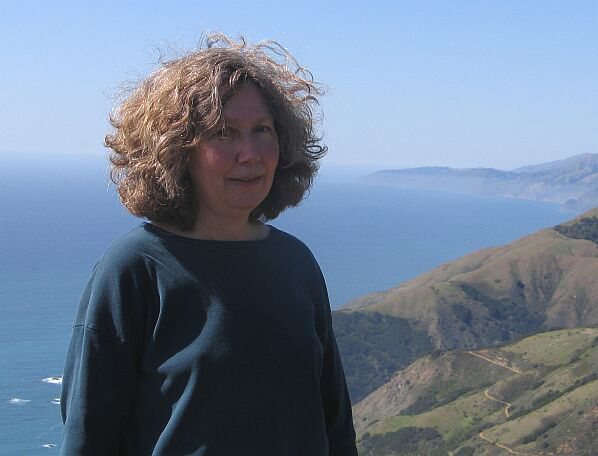
|
Terry Terhaar received a M.F.S. and a Ph.D. in the environmental sciences and humanities from Yale University. Her research resides at the intersection between the social sciences and the humanities, with an emphasis on the human-environment relationship. She has a particular focus on biodiversity conservation; environmental values and ethics; ecology and spirituality; environmental policy; and nature literature. In addition to teaching Environment and Society, she teaches classes for the Writing Program including: Global Warming, Biodiversity, and the Environment; and The Environment, Human Rights, and Social Justice. She loves writing, teaching, being outdoors, and talking with students about any of these activities. She especially likes talking with new students.[6]. 229 College Eight Friday 10:45am-12:15pm and by appt |
| [{{{4}}} website] | |
| John Vesecky | |
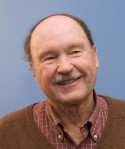
|
John Vesecky is working on Greening the Wharf in Santa Cruz. He also does HF radar design and construction and observation of ocean surface winds, waves and currents with applications to coastal and deep water ocean processes; project MEDSAT. He grew up in Dallas, Texas and studied Electrical Engineering at Rice University before attending graduate school at Stanford. His career in science, engineering and university education spans X-ray astronomy to remote sensing with HF radar and microwaves to renewable energy systems. He taught astronomy at the University of Leicester (UK) and went on to do teaching and research at Stanford, Michigan and now at the University of California, Santa Cruz. In the 1990’s Prof. Vesecky was selected as Sensor Team Leader for Vice-President Gore’s Environmental Task Force that identified classified data of environmental value and argued successfully for declassification. In 1999 he was selected as Founding Chairman of the Electrical Engineering Department in the new Jack Baskin Engineering School. He is an IEEE Fellow. |
| website | |
| Susan Watrous | |
| [[Image:]] | Susan is the Coordinator for the College Eight Core course, a working journalist and editor, and also is the Print Advisor for Student Media mailto:swatrous@ucsc.edu. 113 College Eight Mondays, 6:30-8 pm and Thursdays, 8:30-9:30 am or by appt. |
| [ website] | |
| Clara Weygandt | |
| [[Image:]] | Office: 209 College Eight Mon, Weds and Fridays from 2 to 3 & by appt. |
| [ website] | |
